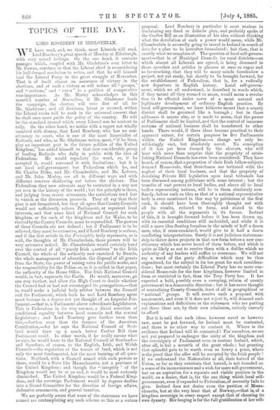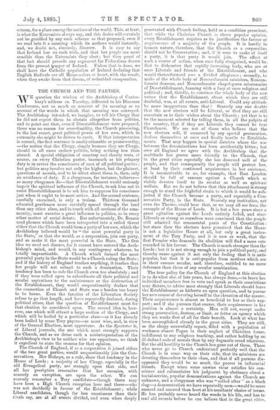TOPICS OF THE DAY.
LORD ROSEBERY IN MIDLOTHIAN.
WE have read, and, we think, most Liberals will read, Lord Rosebery's great speech of Monday at Edinburgh, with very mixed feelings. On the one hand, it contains passages which, coupled with Mr. Gladstone's own letter to Mr. Cowan, convince us that the Liberal chief is reconsidering his half-formed resolution to retire, and that he will himself lead the Liberal Party in the great struggle of November. That is of itself almost an assurance of victory in the elections, and of such a victory as will reduce all "groups," and " sections," and caves " to a position of comparative non-importance. As Mr. Morley acknowledges in this month's number of ..1Iacntillan, if Mr. Gladstone leads the campaign, the electors will vote first of all for Mr. Gladstone ; and all divisions, latent or avowed, within the Liberal ranks will be sunk in the universal consent that he shall once more guide the policy of the country. He will be the standard around which every Liberal can be content to rally. On the other hand, we notice with a regret not wholly unmixed with dismay, that Lord Rosebery, who has no con- stituency to court, who is one of the most Imperialist of Radicals, and who, as Mr. Gladstone writes, must," if he lives, play an important part in the future politics of the United Kingdom," has added himself to that now considerable group of leading Radicals who daily in public with the idea of
Federalism. He would repudiate the word, or, if he accepted it, would surround it with limitations ; but it is not local self-government but Federalism which he, and Sir Charles Dilke, and Mr. Chamberlain, and Mr. Lefevre, and Mr. John Morley, are all in different ways and with different reserves shadowing out before the electors. The Federalism they now advocate may be restricted in a way not yet seen in the history of the world ; but the principle is there, and judging from recent utterances, the restrictions tend fast to vanish as the discussion proceeds. They all say that their plan is not formulated, but they all agree that County Councils would not sufficiently relieve Parliament, or represent local interests, and that some kind of National Council for each kingdom, or for each of the kingdoms and for Wales, to be elected by the County Councils, must be superadded. The powers of these Councils are not defined ; but if Parliament is to be relieved, they must be extensive, and if Lord Rosebery is serious, and if the first article in the Fortnightly truly represents, as is said, the thoughts of Mr. Chamberlain, those powers will be very extensive indeed. Mr. Chamberlain would certainly hand over the control of all " purely Irish questions " to the Irish Council, the whole of the authority now exercised by Boards, the whole management of education, the disposal of all grants from the State, the power of raising rates for public works, and the responsibility for the Police, or, as it is called in that paper, the authority of the Home Office. The Irish National Council would, in fact, supersede the Castle. He would, moreover, go one step further, and allow the High Court to decide whether the Council had or had not overstepped its prerogatives,—that is, would make a judicial body arbiter between the Council and the Parliament, which both he and Lord Rosebery agree must become in a degree not yet thought of an Imperial Par- liament,—that is, a Parliament above subordinate Legislatures. This is Federalism in its very essence, a direct assertion of conditional equality between local councils and the central Legislature ; and Lord Rosebery goes further even than this,—further even than the framers of the American Constitution,—for he says the National Council of Scot- land would draw up a much better Crofter Bill than Parliament could. In other words, if he really means what he says, he would leave to the National Council of Scotland— and therefore, of course, to the English, Irish, and Welsh Councils—the regulation of the tenure of land, which is not only the most fundamental, bat the most burning, of all ques- tions. Scotland, with a Council armed with such powers as these, would be a State like Massachusetts, not a province of the United Kingdom ; and though the " integrity " of the Kingdom would not be at an end, it would be most seriously diminished. The United Kingdom would be a Federal King- dom, and the sovereign Parliament would by degrees decline into a Grand Committee for the direction of foreign affairs, defensive armaments, and general taxation.
We are perfectly aware that none of the statesmen we have named are contemplating any such scheme as this as a serious proposal. Lord Rosebery in particular is most anxious in disclaiming any fixed or definite plan, and probably spoke of the Crofter Bill as an illustration of his idea without thinking what the devolution of such a power would mean, while Mr. Chamberlain is avowedly going to travel in Ireland in search of data for a plan to be hereafter formulated ; but then, that is exactly what we complain of. The question of local self-govern- ment—that is, of Municipal Councils for rural districts—on which almost all Liberals are agreed, is being discussed in these speeches and articles in phrases at once so vague and so far-reaching, that they will to many minds foreshadow a project, not yet ready, but shortly to be brought forward, for the establishment of Federalism, that is, for a radically new departure in English history. Local self-govern- ment, which we all understand, is described in words which, if they meant all they seemed to mean, would mean a revolu- tion to be effected under cover of a most natural and legitimate development of ordinary English practice. By local self-government, we have hitherto meant that a county district shall be governed like a borough ; but in these addresses it means also, or is made to mean, that the power of Parliament shall be limited, and that the control of immense sections of national business shall be transferred to other hands. There would, if these ideas became practical to their apparent extent, for certain purposes be five Parliaments within the United Kingdom—a change not only be- wilderingly vast, but absolutely novel. No conception of it has yet been formed by the electors, who will hear with more than surprise that the propriety of estab- lishing National Councils has even been considered. They have heard, of course, that a proportion of their Irish fellow-subjects demand Home-rule, that Scotchmen are irritated with the neglect of their local business, and that the propriety of devolving Private Bill legislation upon local tribunals has been discussed among politicians with some interest ; but the transfer of vast powers to local bodies, and above all to local bodies representing nations, will be to them absolutely new. Surely, before such an idea as that of a national representative body is even mentioned in this way by politicians of the first rank, it should have been thoroughly thought out with all its results, reduced to form, and stated to the people with all the arguments in its favour. Instead of this, it is brought forward before it has been drawn up, with its essential conditions still undecided, and while it is still a mere idea floating formless in the minds of half a dozen men, who, if cross-examined, would give to it half a dozen conflicting interpretations. Surely it is not judicious statesman- ship to throw down projects in that raw form before a new con- stituency which has never heard of them before, and which is quite as likely as not to receive them with a dislike which no authority of any leaders will suffice to overcome. We will not say a word of the party difficulties which may be thus engendered, for the subject is far too great for such considera- tions ; but most certainly the Liberal Party has no more con- sidered Home-rule for the four kingdoms, however limited in form or restricted in fact, than the Tory Party has. It has expected a bold, possibly even a sweeping, reform of county government in a democratic direction ; but it has never thought of centralising County Councils, least of all in geographical or " national " groups. It will receive such a proposal with amazement, and even if it does not reject it, will demand such explanations and definitions as the statesmen who are putting out these ideas are, by their own admission, entirely unready to afford.
But it is said that such ideas, however novel or however raw, must be put forward, for Ireland must be contented, and there is no other way to content it. Where is the evidence that Ireland will be contented ? For ourselves, we are not yet prepared to endanger the unity of the kingdom and the sovereignty of Parliament even to content Ireland, which, after all, is but a seventh of the great whole ; but granting that splendid gain to be worth even so heavy a price, where is the proof that the offer will be accepted by the Irish people ? If we understand the Nationalists at all, their hatred of the Union, so far as they entertain that hatred, is not founded on a sense of its inconvenience and a wish for more self-government, but on an aspiration for a separate and visible position in the world, on a desire, that is, for the one thing which local self- government, even if expanded to Federalism, of necessity fails to give. Ireland does not desire even the position of Massa- chusetts, but at the very least that of Norway,—that is, of a kingdom sovereign in every respect except that of choosing its own dynasty. Her longing is for the full gratification of her self- esteem, for a place among the nations of the world. This, at least, is what the Extremists always say, and this desire will certainly not be gratified by any such scheme as that proposed, even if we read into it a meaning which its authors would instantly, and, we doubt not, sincerely, disavow. It is easy to say that Ireland has no such wish, and that her people are more sensible than the Extremists they elect ; but then proof of that fact should precede any argument for Federalism drawn from the present temper of Ireland. Unless that is done, we shall have the Catholic population of Ireland declaring that English Radicals are all Home-rulers at heart, with the result, when they awake from that dream, of redoubled exasperation.



































 Previous page
Previous page